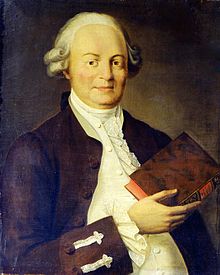Wassili Kirillowitsch Trediakowski

Vasily Trediakovsky ( Russian Василий Кириллович Тредиаковский , scientific transliteration. Vasilij Kirillovic Trediakovskij ; February * 22 . Jul / 5. March 1703 greg. In Astrakhan ; † August 6 jul. / 17th August 1769 greg. In Saint Petersburg ) was a Russian poet and literary theorist who is considered one of the founders of classical Russian literature .
Life
Trediakowski was born the son of a poor priest , but was the first non-noble man to receive a humanistic education abroad financed by the Russian state. From 1727 to 1730 he studied at the Sorbonne in Paris . Soon after his return to Russia, he became secretary of the Russian Academy of Sciences and de facto court poet.
In 1735 Trediakowski published Новый и краткий способ к сложению российских стихов (“A new and quick method of writing Russian poems”), where for the first time in Russian literature poetic genres such as sonnet , rondeau , and ode were discussed , madrigal and ode . In his approach to poetry, which was new for Russia, he was supported by his friend, poet and satirist Antioch Kantemir . In 1748 Разговор об орфографии ("A Discussion of Orthography"), the first study of the phonetic structure of the Russian language, appeared. Trediakowski continued his commitment to poetic reforms in 1752 with the work О древнем, среднем и новом стихотворении российском ("On the old, middle and new Russian poetry").
Trediakowski was also a prolific translator of classical authors, medieval philosophers and French literature . His translations often aroused the ire of the censors and he soon fell out of favor with superiors in the academy and in conservative court circles. In 1759 he was expelled from the academy. His last major work was a translation of François Fénelon's Les aventures de Telemaque in 1766.
Trediakowski's work was characterized by the transition from syllabic to metrical stanzas, which corresponded more to the sound of the Russian language. His theories were impressively confirmed in the works of his literary rival Mikhail Lomonosov .
Web links
- Biography at peoples.ru (Russian)
- Biography at krugosvet.ru (Russian)
- Trediakowski's collection of biographies from printed dictionaries (Russian)
- Text collection by Trediakowski (Russian)
| personal data | |
|---|---|
| SURNAME | Trediakowski, Wassili Kirillowitsch |
| ALTERNATIVE NAMES | Trediakovskij, Vasilij Kirillovič (scientific transliteration); Тредиаковский, Василий Кириллович (Russian spelling) |
| BRIEF DESCRIPTION | Russian poet and literary theorist |
| DATE OF BIRTH | March 5, 1703 |
| PLACE OF BIRTH | Astrakhan |
| DATE OF DEATH | 17th August 1769 |
| Place of death | St. Petersburg |